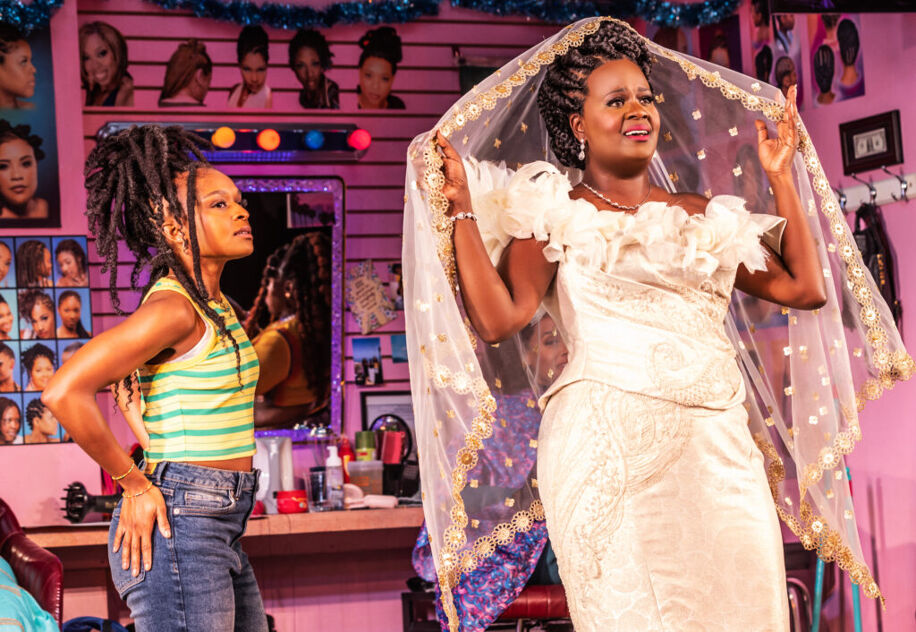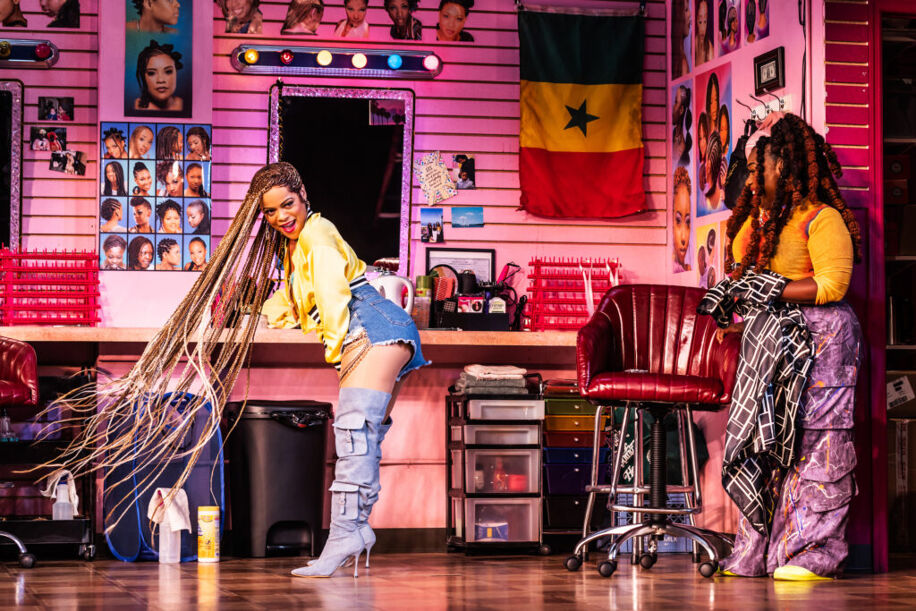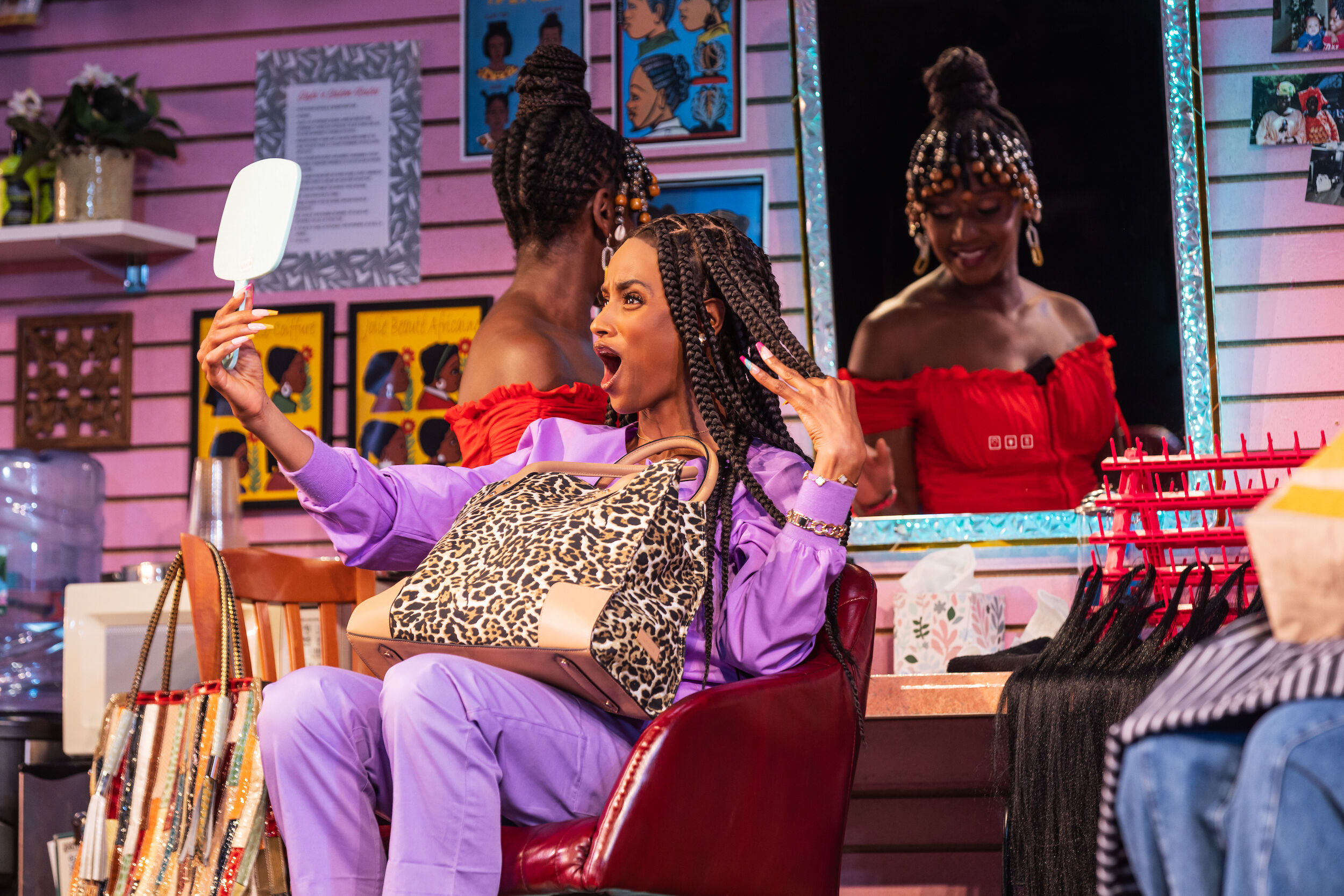The women in Jaja’s African Hair Braiding are attuned to the conflict and disdain that come from those closest to us. When one says “I don’t want my family to say anything. And they are always saying something,” the rest of her co-workers break into laughter and cheer in agreement. They also carry that same mix of camaraderie and ridicule for each other. But they carry it all with such exuberance that even a Broadway house seems too small to contain it.
But beyond all the joy, Jocelyn Bioh’s world premiere play tackles tangible issues that feel as if pulled from front-page news as six African women try to survive despite the hostile bureaucracy of the U.S. immigration system. They left their homes — Senegal, Sierra Leone, Ghana — with bright hopes that still haven’t been extinguished despite the everyday grind.
The setting is Harlem, summer 2019, at that namesake salon. We first meet two characters who braid hair. Before long, there are four, and then more as the stage fills with braiders, their customers, and other neighborhood residents. David Zinn’s furniture-packed scenic design immediately draws the audience into the women’s complicated lives. A blaring TV and radio, chairs, mirror, and — per the play’s title — plenty of hair clutter the bubblegum pink salon, creating an overstuffed container for the personalities and stories that inhabit it.
Jaja’s African Hair Braiding is another chapter in a long-lasting Black pop culture mainstay; the female friendship project. From TVs Living Single in the 1990s (currently enjoying a renaissance on streaming) to Whitney Houston and Angela Bassett’s Waiting to Exhale (1995) to recent examples like Girls Trip (2017) and Issa Rae’s Insecure, among others. By taking on a specific Black art like braiding and setting it among African immigrants in Harlem, Bioh adds an expansive and modern viewpoint to a popular genre.

Bioh dedicates the play to the “hopes and dreams of the craftswomen and artists” that she knew as someone who has always worn her hair in braids. That familiarity with how these women talk and form a community distinguishes this play: there’s a rhythm to their gossip, to how they cajole and tease each other. Even when the trash talk turns serious and becomes more about competition for wages and customers, Bioh never loses sight of her characters’ intimacy and understanding. They are fun but also fragile, carrying the weight of family far away and dreams unfulfilled.
Jaja’s African Hair Braiding is another chapter in a long-lasting Black pop culture mainstay; the female friendship project.
Miriam (Brittany Adebumola) talks of the daughter she left behind and the handsome singer she still carries a torch for. Aminata (Nana Mensah) has no time for rude customers yet gives her lazy boyfriend one chance after another. Marie (Dominique Thorne) tries to keep her background and identity from schoolmates lest they discover she is undocumented. Ndidi (Maechi Aharanwa) hides behind the music on her headphones as she mourns the store she lost. Bea (Zenzi Williams, the funniest in a cast of funny ladies) loudly laments the business opportunities she gave up and talks of how things will improve when she gets her own salon. They all work for Jaja (Somi Kakoma), who keeps them waiting all day until she arrives in full bride regalia. It’s her wedding day; she’s marrying an American and will finally become “legal.”

Throughout it all, there’s time for dance breaks and lip-synching to dramatic monologues from TV melodramas. Even a toast. But life catches up to them, and hardship is always just around the corner. Bioh portrays how these women cope and rally around their community. They might compete for customers, disapprove of each other’s choices, and gossip behind everyone’s back.
But when things become serious, even calamitous, they take care of each other. Perseverance is the only choice. The play’s sobering turn is an everyday occurrence, yet it’s easy to be lulled by how these women present themselves outwardly, fooled by their happy exteriors. Now we understand, and more importantly, recognize, the reality of their situation. When you are an immigrant there’s no room for error.
LGBTQ+ audiences will recognize the otherness these women feel. Though none specifically identify as queer, they understand what it feels like to be treated like outsiders, creating a mask of perfection to deflect vulnerability. But Bioh eventually reveals their truths. Stories about the bonds among Black women derive their strength from the recognizable vernacular of their characters and their capacity to find joy in the most stressful of times. Jaja’s African Hair Braiding makes for a worthy addition to that tradition. ♦
Jaja’a African Hair Braiding plays on Broadway at the Samuel J. Friedman Theatre through November 5.
Related:
How the Chicago premiere of ‘Sanctuary City’ is holding space for the next generation of queer theatermakers
Majok, whose 2016 play Cost of Living won the Pulitzer Prize in Drama, here creates an intimate three-person play with a unique structure.
Don't forget to share:
Help make sure LGBTQ+ stories are being told...
We can't rely on mainstream media to tell our stories. That's why we don't lock our articles behind a paywall. Will you support our mission with a contribution today?
Cancel anytime · Proudly LGBTQ+ owned and operated
Read More in Entertainment
The Latest on INTO
Subscribe to get a twice-weekly dose of queer news, updates, and insights from the INTO team.
in Your Inbox
















